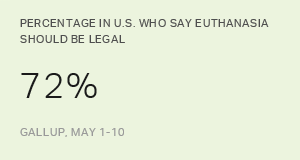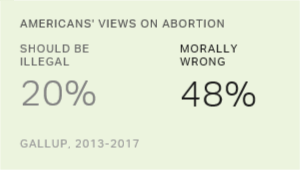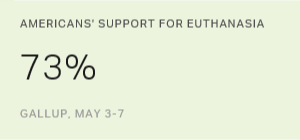Story Highlights
- 72% say doctors should be able to help terminally ill patients die
- Fewer, 65%, express support when the question includes "commit suicide"
- 54% think doctor-assisted suicide is morally acceptable
WASHINGTON, D.C. -- A broad majority of Americans, 72%, continue to believe that doctors should be legally allowed, at a patient's and a family's request, to end a terminally ill patient's life using painless means. While support for legalized euthanasia is strong across nearly all subgroups of Americans, men, young adults, Democrats and liberals are especially likely to favor it. Support drops below a majority only among weekly churchgoers.
| Yes, should | No, should not | |||||||||||||||||||||||||||||||||||||||||||||||||||||||||||||||||||||||||||||||||||||||||||||||||||
|---|---|---|---|---|---|---|---|---|---|---|---|---|---|---|---|---|---|---|---|---|---|---|---|---|---|---|---|---|---|---|---|---|---|---|---|---|---|---|---|---|---|---|---|---|---|---|---|---|---|---|---|---|---|---|---|---|---|---|---|---|---|---|---|---|---|---|---|---|---|---|---|---|---|---|---|---|---|---|---|---|---|---|---|---|---|---|---|---|---|---|---|---|---|---|---|---|---|---|---|---|
| % | % | |||||||||||||||||||||||||||||||||||||||||||||||||||||||||||||||||||||||||||||||||||||||||||||||||||
| All adults | 72 | 27 | ||||||||||||||||||||||||||||||||||||||||||||||||||||||||||||||||||||||||||||||||||||||||||||||||||
| Gender | ||||||||||||||||||||||||||||||||||||||||||||||||||||||||||||||||||||||||||||||||||||||||||||||||||||
| Men | 79 | 20 | ||||||||||||||||||||||||||||||||||||||||||||||||||||||||||||||||||||||||||||||||||||||||||||||||||
| Women | 65 | 34 | ||||||||||||||||||||||||||||||||||||||||||||||||||||||||||||||||||||||||||||||||||||||||||||||||||
| Age | ||||||||||||||||||||||||||||||||||||||||||||||||||||||||||||||||||||||||||||||||||||||||||||||||||||
| 18 to 29 | 85 | 15 | ||||||||||||||||||||||||||||||||||||||||||||||||||||||||||||||||||||||||||||||||||||||||||||||||||
| 30 to 49 | 72 | 28 | ||||||||||||||||||||||||||||||||||||||||||||||||||||||||||||||||||||||||||||||||||||||||||||||||||
| 50 to 64 | 67 | 29 | ||||||||||||||||||||||||||||||||||||||||||||||||||||||||||||||||||||||||||||||||||||||||||||||||||
| 65 and older | 65 | 34 | ||||||||||||||||||||||||||||||||||||||||||||||||||||||||||||||||||||||||||||||||||||||||||||||||||
| Party ID | ||||||||||||||||||||||||||||||||||||||||||||||||||||||||||||||||||||||||||||||||||||||||||||||||||||
| Republican | 62 | 37 | ||||||||||||||||||||||||||||||||||||||||||||||||||||||||||||||||||||||||||||||||||||||||||||||||||
| Independent | 73 | 27 | ||||||||||||||||||||||||||||||||||||||||||||||||||||||||||||||||||||||||||||||||||||||||||||||||||
| Democrat | 80 | 17 | ||||||||||||||||||||||||||||||||||||||||||||||||||||||||||||||||||||||||||||||||||||||||||||||||||
| Ideology | ||||||||||||||||||||||||||||||||||||||||||||||||||||||||||||||||||||||||||||||||||||||||||||||||||||
| Conservative | 54 | 46 | ||||||||||||||||||||||||||||||||||||||||||||||||||||||||||||||||||||||||||||||||||||||||||||||||||
| Moderate | 79 | 20 | ||||||||||||||||||||||||||||||||||||||||||||||||||||||||||||||||||||||||||||||||||||||||||||||||||
| Liberal | 89 | 11 | ||||||||||||||||||||||||||||||||||||||||||||||||||||||||||||||||||||||||||||||||||||||||||||||||||
| Church attendance | ||||||||||||||||||||||||||||||||||||||||||||||||||||||||||||||||||||||||||||||||||||||||||||||||||||
| Attend church weekly | 37 | 60 | ||||||||||||||||||||||||||||||||||||||||||||||||||||||||||||||||||||||||||||||||||||||||||||||||||
| Attend church nearly weekly/monthly | 69 | 30 | ||||||||||||||||||||||||||||||||||||||||||||||||||||||||||||||||||||||||||||||||||||||||||||||||||
| Attend church seldom/never | 86 | 14 | ||||||||||||||||||||||||||||||||||||||||||||||||||||||||||||||||||||||||||||||||||||||||||||||||||
| Gallup, May 1-10, 2018 | ||||||||||||||||||||||||||||||||||||||||||||||||||||||||||||||||||||||||||||||||||||||||||||||||||||
These findings, from Gallup's annual Values and Beliefs poll conducted May 1-10, are consistent with data from recent years. However, opinions have changed since Gallup first gauged the public's attitudes about euthanasia in 1947 and 1950. At that point, fewer than four in 10 supported legally and painlessly ending a terminally ill patient's life. But in 1973, when the question was next asked, a slim 53% majority were in favor.
Since 1990, support has not dipped below 64% and has been as high as 75%. And since 2013, at least 69% of Americans have supported euthanasia for terminally ill patients.
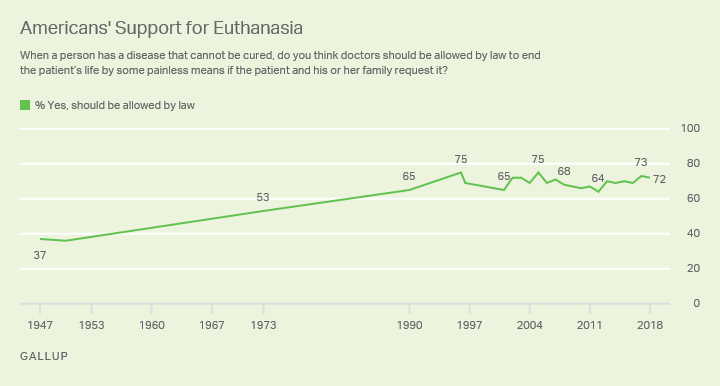
Steady Support for Doctor-Assisted Suicide
Euthanasia involves someone other than the terminally ill patient administering lethal medication, and is illegal in the U.S. By contrast, a related procedure widely known as "doctor-assisted suicide" involves the patient self-administering a fatal dose of medication prescribed by a doctor and is legal in a handful of states.
Gallup asks Americans a separate question about this second approach, doctor-assisted suicide. And although this has legal backing in some states, it receives less public support in Gallup's polling than euthanasia, possibly because the question contains the phrase "commit suicide." The euthanasia question uses the language "end the patient's life by some painless means," which may sound less harsh than committing suicide.
Gallup has measured Americans' views of doctor-assisted suicide since 1996, and in most years, support for it has been slightly lower than for euthanasia, though it has never fallen below 51%. Currently, 65% of Americans think doctors should be legally allowed to assist a patient in dying by suicide.
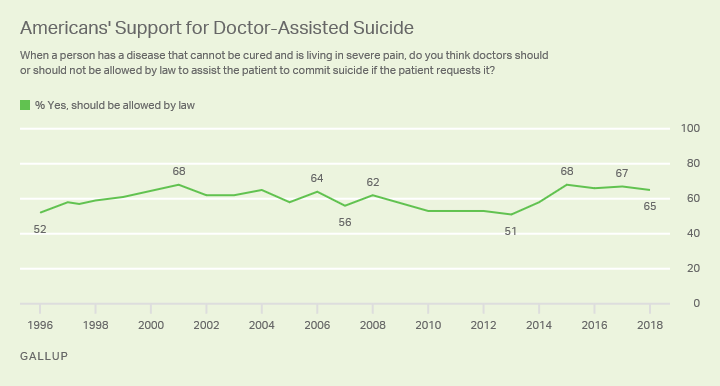
Support for doctor-assisted suicide varies less by subgroup than support for euthanasia. The most notable subgroup differences for physician-assisted suicide are by ideology and frequency of church attendance.
| Yes, should | No, should not | |||||||||||||||||||||||||||||||||||||||||||||||||||||||||||||||||||||||||||||||||||||||||||||||||||
|---|---|---|---|---|---|---|---|---|---|---|---|---|---|---|---|---|---|---|---|---|---|---|---|---|---|---|---|---|---|---|---|---|---|---|---|---|---|---|---|---|---|---|---|---|---|---|---|---|---|---|---|---|---|---|---|---|---|---|---|---|---|---|---|---|---|---|---|---|---|---|---|---|---|---|---|---|---|---|---|---|---|---|---|---|---|---|---|---|---|---|---|---|---|---|---|---|---|---|---|---|
| % | % | |||||||||||||||||||||||||||||||||||||||||||||||||||||||||||||||||||||||||||||||||||||||||||||||||||
| All adults | 65 | 34 | ||||||||||||||||||||||||||||||||||||||||||||||||||||||||||||||||||||||||||||||||||||||||||||||||||
| Gender | ||||||||||||||||||||||||||||||||||||||||||||||||||||||||||||||||||||||||||||||||||||||||||||||||||||
| Men | 68 | 31 | ||||||||||||||||||||||||||||||||||||||||||||||||||||||||||||||||||||||||||||||||||||||||||||||||||
| Women | 63 | 37 | ||||||||||||||||||||||||||||||||||||||||||||||||||||||||||||||||||||||||||||||||||||||||||||||||||
| Age | ||||||||||||||||||||||||||||||||||||||||||||||||||||||||||||||||||||||||||||||||||||||||||||||||||||
| 18 to 29 | 66 | 34 | ||||||||||||||||||||||||||||||||||||||||||||||||||||||||||||||||||||||||||||||||||||||||||||||||||
| 30 to 49 | 62 | 38 | ||||||||||||||||||||||||||||||||||||||||||||||||||||||||||||||||||||||||||||||||||||||||||||||||||
| 50 to 64 | 64 | 34 | ||||||||||||||||||||||||||||||||||||||||||||||||||||||||||||||||||||||||||||||||||||||||||||||||||
| 65 and older | 69 | 29 | ||||||||||||||||||||||||||||||||||||||||||||||||||||||||||||||||||||||||||||||||||||||||||||||||||
| Party ID | ||||||||||||||||||||||||||||||||||||||||||||||||||||||||||||||||||||||||||||||||||||||||||||||||||||
| Republican | 59 | 40 | ||||||||||||||||||||||||||||||||||||||||||||||||||||||||||||||||||||||||||||||||||||||||||||||||||
| Independent | 69 | 30 | ||||||||||||||||||||||||||||||||||||||||||||||||||||||||||||||||||||||||||||||||||||||||||||||||||
| Democrat | 64 | 35 | ||||||||||||||||||||||||||||||||||||||||||||||||||||||||||||||||||||||||||||||||||||||||||||||||||
| Ideology | ||||||||||||||||||||||||||||||||||||||||||||||||||||||||||||||||||||||||||||||||||||||||||||||||||||
| Conservative | 51 | 48 | ||||||||||||||||||||||||||||||||||||||||||||||||||||||||||||||||||||||||||||||||||||||||||||||||||
| Moderate | 70 | 28 | ||||||||||||||||||||||||||||||||||||||||||||||||||||||||||||||||||||||||||||||||||||||||||||||||||
| Liberal | 79 | 21 | ||||||||||||||||||||||||||||||||||||||||||||||||||||||||||||||||||||||||||||||||||||||||||||||||||
| Church attendance | ||||||||||||||||||||||||||||||||||||||||||||||||||||||||||||||||||||||||||||||||||||||||||||||||||||
| Attend church weekly | 41 | 58 | ||||||||||||||||||||||||||||||||||||||||||||||||||||||||||||||||||||||||||||||||||||||||||||||||||
| Attend church nearly weekly/monthly | 58 | 42 | ||||||||||||||||||||||||||||||||||||||||||||||||||||||||||||||||||||||||||||||||||||||||||||||||||
| Attend church seldom/never | 78 | 20 | ||||||||||||||||||||||||||||||||||||||||||||||||||||||||||||||||||||||||||||||||||||||||||||||||||
| Gallup, May 1-10, 2018 | ||||||||||||||||||||||||||||||||||||||||||||||||||||||||||||||||||||||||||||||||||||||||||||||||||||
A slim majority of conservatives (51%) think assisted suicide should be legal, compared with 79% of liberals. As is the case with euthanasia, less than half of weekly churchgoers (41%) support assisted suicide, which is not surprising, given that most Jews and Christians are taught that suicide is a sin.
Doctor-Assisted Suicide Considered Morally Acceptable
Gallup has measured Americans' opinions on the moral acceptability of "doctor-assisted suicide" in the context of a wide range of issues since 2001. A slim majority of Americans (54%) currently think doctor-assisted suicide is morally acceptable, and 42% think it is morally wrong. This latest reading is in line with findings since 2014.
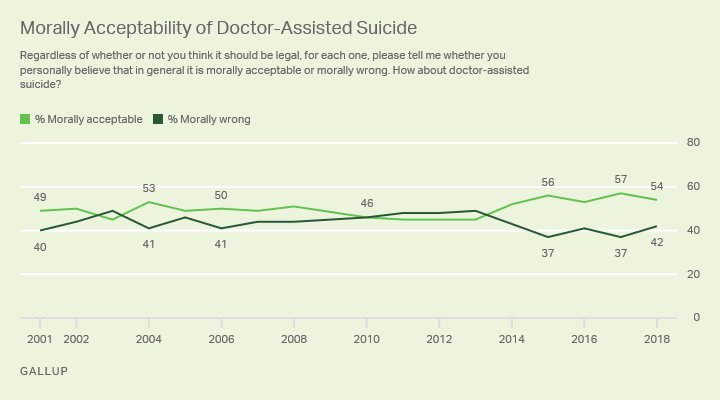
Again, liberals (71%) and infrequent churchgoers (69%) are much more likely than their conservative (39%) and weekly churchgoing (26%) counterparts to say doctor-assisted suicide is morally acceptable. Catholics and Protestants are evenly divided.
These findings are in line with a general tendency for Americans often to be hesitant to ban behaviors even if they think they are morally wrong. It is not surprising, then, that Americans remain more likely to say doctor-assisted suicide is morally wrong than to say it shouldn't be made legal. Similar patterns are evident in their attitudes about abortion and same-sex relations.
Bottom Line
Support for "right-to-die" laws remains high in Gallup's 2018 update, with majorities of Americans across most demographic groups supporting physician-assisted suicide, as well as euthanasia. Although several states have passed legislation to allow terminally ill patients to die on their own terms, more than 40 states have not done so.
While the public supports both physician-assisted suicide and euthanasia, the most avid churchgoers oppose them. And even given public support for these practices, Americans are more closely divided on whether assisted suicide is morally acceptable. This could be an obstacle to the passage of more legislation regarding Americans' right to end their lives with medical assistance.
Survey Methods
Results for this Gallup poll are based on telephone interviews conducted May 1-10, 2018, with a random sample of 1,024 adults, aged 18 and older, living in all 50 U.S. states and the District of Columbia. For results based on the total sample of national adults, the margin of sampling error is ±4 percentage points at the 95% confidence level; for the samples of 542 adults in Form A and 482 adults in Form B, the margin of sampling error is ±5 percentage points at the 95% confidence level. All reported margins of sampling error include computed design effects for weighting.
Each sample of national adults includes a minimum quota of 70% cellphone respondents and 30% landline respondents, with additional minimum quotas by time zone within region. Landline and cellular telephone numbers are selected using random-digit-dial methods.
View complete question responses and trends (PDF download).
Learn more about how the Gallup Poll Social Series works.
